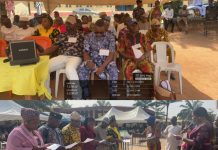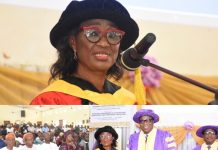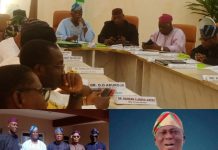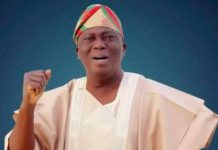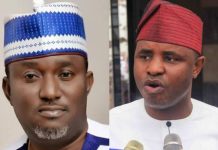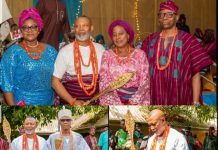
Dr Felix Ale is the first space journalist in Africa. In this interview with Hakeem Adebumiti, the Head of Media at Nigeria’s Space Agency, NASRDA, spoke on his time with the Ondo State Radiovision Corporation (OSRC), Akure; his sojourn into academics and space journalism and what the unbundling of mass communication portends for the discipline.
How was growing up like?
It was great fun growing up in my ancient community, Oka-Akoko, headquarters of Akoko South West Local Government of Ondo State. As a child, when you feel a great sense of love from your parents and people around you, you feel more secured and happy and with great determination to succeed in life. I’m the 5th child out of nine by my parents. Ours was a big family and it was life at its fullest. The key to manage a large family is patience and organization. My parents were so caring and wonderful. I will always cherish them for their love, care, understanding and special attention for each and every one of us. During my days in the primary school, I received occasional visitation from both my mother and my late grandmother. They visit to know how I was doing in class. The visits were great source of encouragement and challenge to me. It may interest you to know that from primary one to five, I was always the Captain (Class Representative) of my class. And, in primary six, I became the Assistant senior prefect of the school. That underscores my high level commitment and dedication to academic excellence. I was never carried away with the euphoria of that moment, rather I saw the special attention from my parents and grandmother as a great challenge to do better and be somebody in the years ahead. I thank God that I have not disappointed them. When I lost my grandmother sometime in 1995, I was a reporter in OSRC then. I did not only give her glorious exit the best of publicity, but I played my part in giving her a very befitting burial. The story was also same when I lost my Dad. My father had the best of his moment during his old age before his glorious exit. This was made possible with the special grace granted me to take proper care of him and his darling wife who is still very much with us.
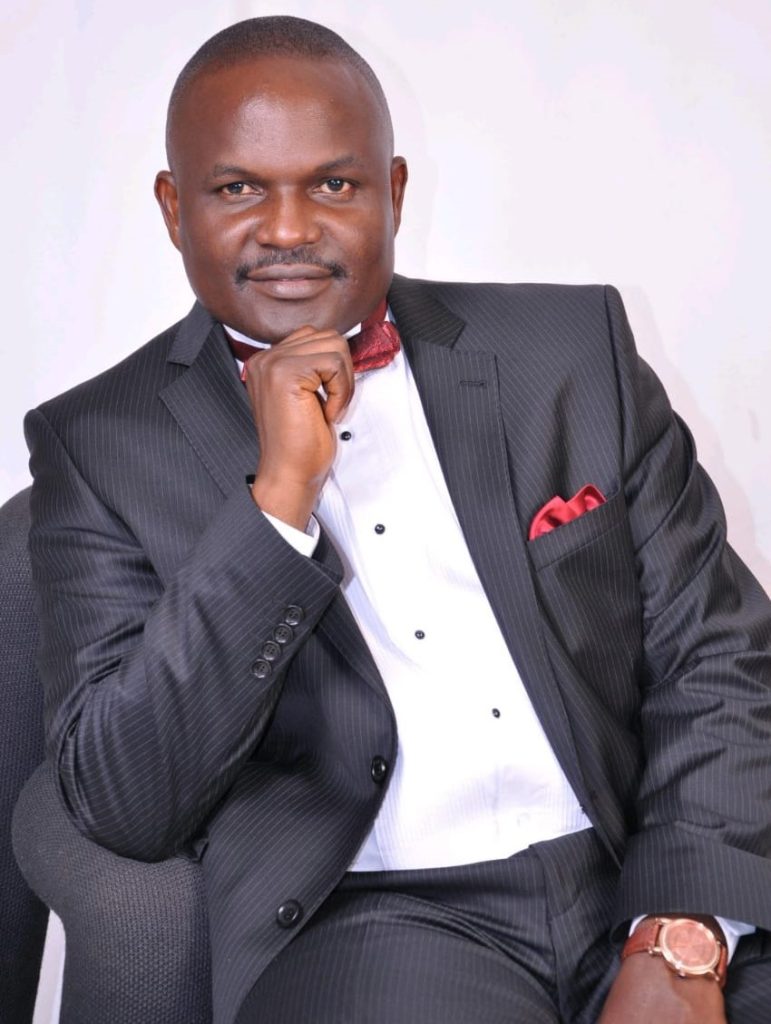
What was that motivating factor that took you to the media industry?
My passion for journalism is dated back to my days in the primary school. I was always with my Dad whenever he held on to his radio to listen to news. My Dad doesn’t listen to other programmes except the news and the then popular “OGBEERO” programme being anchored by Ige Jongbo. I asked from him several times why he was always anxious to listen to news every other day, but he will simply replied that, with daily news on radio or television, you will not only be better informed about happenings around you, but be very much abreast of current government programmes and policies.
The early interest for news later crystalized into my passion and decision to choose journalism as a career to pursue in life. I have no apology or regrets for this. Journalism remains one of the noblest professions, and becoming a journalist means you literally live in bit. What the profession teaches you is patience, objectivity, and changes your perspective of the world. As a journalist, you get to learn a lot on the job while you also get to meet people from all works of life. The passion to find a good story is the essence of this profession. I cannot think of any other career I would rather have. The training I got in journalism school was important and shaped who I was as a Reporter and Editor. It has also assisted in making me not only dedicated and committed but also a super star in wherever I find myself. I cannot think of any other career I would rather have. Today, Journalism has emerged as a top career choice across the globe. I have been privileged to visit several countries, both developed and developing nations, I can tell you that journalism remains a noble profession. It is a profession where you can never be forgotten if you play your card very well. For example, I have been out of Ondo state for a long time now but I want to tell you that, till now my name Felix Ale remains a household name in the Sunshine State because of my remarkable years of journalism practice.
You have been at the Nigeria space agency for close to two decades now. What has been the import of Nigeria’s launching of sat-1?
The import of space technology to any nation are numerous. Space defines the comprehensive power of a nation. The launch of Nigeria SAT-1 signaled the Nigeria venture into space. It also marked the beginning of Nigeria noble contribution to the international disaster monitoring constellation (DMC). This is a novel international cooperation in space bringing together organizations from seven countries that is Algeria, China, Nigeria, Thailand, Turkey, the United Kingdom and Vietnam, in forming the first-ever microsatellite constellation for remarkable Earth observation capabilities both nationally to the individual satellite owners and internationally to benefit worldwide humanitarian efforts. Nigeria Sat-1, which was the first satellite to be launched by Nigeria was extensively used in many space application areas for the growth and development of our country. It was used to support food production as well as disaster relief around the world including helping with the aftermath of Hurricane Katrina in the United States. The Nigeria SAT-1 spacecraft was equipped with high resolution optical and infrared cameras for food production, improved security and environmental monitoring. Nigeria SAT-1 lasted until 2012, four years longer than its designed lifespan and was succeeded by Nigeria SAT-2 and Nigeria SAT-X which were both lunched in 2011 and still functioning effectively in the orbit. The Nigeria space programme has remain a good story to tell about our country as a nation and indeed the continent of Africa. It has been a success story and we are glad to be part of historical drive and efforts to position the country in space to keep the pace and for the socio-economic development of our great country.
You are known to be a humble and easy going person, in what do you derive your fulfillment?
I derive Joy and fulfilment in meeting the needs of people who look up to me for one assistance or the other, particularly the less privileged. My main focus is to always be part of a “progressive commandos” to uplift the standard of living of the downtrodden in our society as well as making others happy with available resources at my disposal. This has always been part of me even long before now. You will recall how I was nicknamed “Baba Dangote” during my years of practice in the Ondo State Radiovision Corporation (OSRC). The nickname was in recognition and profound appreciation of my generosity, particularly my ability to give freely and share the little I have with Friends and colleagues. A lot of people still call me Aliko Dangote till now even though I have no resources to match up to the real Multi Billionaire who is the richest Man in Africa today. I truly believe in sharing whatever I have with others so that we can all be happy. To me, life is about give and take. Hence, success is increasingly dependent on how we interact with others. Even in the course of helping others to get better with the little resources I have and opportunities at my disposal, I have been unduly embarrassed and hurt out of ignorance but I have never been discouraged in my determination to continue to be a source of blessing to others even to people more privileged and opportune than myself. We must learn to light a candle in the darkest moment of someone’s life and be the light that helps others see. This is what gives life its deepest significance. Winston Churchill once said, “We make a living by what we get, and we make a life by what we give”. May I therefore seize this opportunity to appeal to each and every one of us never to relent in giving to others particularly those in need to make a life. This is the only way we can make the society better for the benefits of all.
Now, you are in what I will call a new terrain-space journalism and working at the federal level, can you juxtapose your experience at the state level and as spokesperson of the Nigerian space agency?
Well, on one hand I will say that, there are no much differences and on the other hand, I will say that the few differences one can identify came with a lot of challenges. I will say no much difference in the sense that journalism anywhere in the world has to do with writing, production and distribution of reports. When you have this foundation, you can easily fit in anywhere. My experience at the state level as a Reporter, Editor and later as Government House Correspondent and Chief Press Secretary adequately prepared me and provided a formidable platform for me to run the race of my chosen career and in the game of life. Hence it was a little bit easier for me to cope with the situation as it were following my assumption of office as the pioneer Spokesperson for the Nigeria Space Agency. The only challenge was the task to key into the capacity building strategy of the Agency for proper growth and development within the system and for effective performance. My educational background as a Master’s degree holder before joining the Space Agency made it easier to align myself because qualitative education is like a driving license in any Space research organisation anywhere in the world. With this background, I swung into actions in pursuance of relevant programmes in some leading Universities across the globe for more knowledge acquisition and professional certification in my new terrain. These include Kennedy school of Government of the Harvard University in United States, University of Oxford in United Kingdom and the famous International Space University in Strasburg-France. I maintained this trend and remained undaunted until I later commenced academics works for my Ph.D and I successfully completed the required course works and graduated in 2015 after my final defense. I graduated with honour and also with the first research interest on Space Journalism at Doctoral level in sub-Sahara Africa. By and large, I will say my experience at the State level, particularly in OSRC prepared me adequately for this greater challenge. Hence I will never forget OSRC as the root of my professional career.
You are a PhD holder in space journalism, unarguably the first in Africa with such feat. What is special about that field of communication?
I can tell you that Space journalism is very special in the field of communication. It is a critical area in the field of journalism that fulfills an important societal function in popularising Space Science and Technology. In one of my research publications entitled “The Noble role of Space journalism in global history”, I did emphasize that the space age was ushered in by the Cold war era. However, the media spurred it through reporting and analysis about the tussle between the United States and Soviet Union. The Sputnik made space exploration possible and prompted the United States to embrace the technology. During the Cold war the Soviets and United States engaged in a war that was less physical but was more about threats and threats making and given that the soviets had been the first to come up with the idea of space crafts, the United States was obligated to follow and probably make it better. The reports by the media on the space capabilities of each side led to the drive four Nations to develop their space capacities. Hence the crucial beginning of space journalism in media practice. I will also like to explain further that “Space Journalism” is getting more popular and I’m so glad about that. The focus of my PhD research work is not only on space journalism but also on new media which is to me, very critical to our society today. My goal was not just to be one of the pioneers in this very important and critical areas of human society but inspire as many people as possible to appreciate why Space matters. Exploration of space is the most significant thing we ever do as a species. We are living in a space age a world transformed by space and if we are to continue exploring space we need to tell great stories about why space matters. This is the only way people can understand the science we are learning from such missions. If humanity doesn’t have a future in space then we have no future. Everything in the global community today revolves around space technology. Hence we must give this critical sector a pride of place by prioritizing Space exploration as our goal.
What are you doing to encourage more scholars of communication to go to such areas of specialization?
I have actually been doing a lot to encourage more scholars and students of communication to embrace this specialization. I have done this in several ways particularly in my presentation as Guest Speaker in different national and international fora. I have also taken advantage of my participation in various media interviews both in the print and electronic across the globe to reinforce my advocacy on Space Journalism and Science communication generally. My presentation as Guest speaker in one of the leading universities in India popularly known as Goenka University led to my appointment as a member of the governing council of the university’s school of communication. It is on record that I remain the first African or black man to be so honoured in that capacity in the history of that great institution.
Let me quickly emphasize that one of the requirements in this area of specialization is having a deep understanding and passion for Space. We must be prepared to dwell on Space in order to get people excited and informed about how and why we are exploring the infinite frontier. It is very important so that people can understand the science we are learning from such missions.
You were once a field reporter at OSRC Akure and people say a lot about your time at the station. Will you say you miss TV journalism?
My working career at the Ondo State Radiovision Corporation, Akure was indeed an inspiring one. I started my journalism career in the station which was one of the best in the Southwest and the country at large that time and I grew up to become a celebrity in the field of journalism. There is no way I can forget my professional sojourn in this great organization because it provided the platform for me to build a very solid foundation for myself as a field reporter and budding journalist. I worked effectively on the news desk, current affairs and covered various bits in the reportorial including the Ondo State government House. My Name, Felix Ale resonates on both radio and television stations and thus became a household name. Again my professional competence and display of high level of professionalism made it possible for me to serve two military governors in Ondo state and later as Chief Press Secretary to a democratically elected government in the State. Looking at my rising profile in this profession and what God has done for me I have every reason to be thankful to God. Again there is no way I will not miss my days in OSRC particularly when I flash my mind back to recall how it all started. My numerous human angle stories and my various senior and junior colleagues in the newsroom. I remember the then Bishop of Akure Anglican diocese, Rt. Reverend Ipinmoye telling me at that time when one of my popular human angle reports on the popular Sunday splash program almost made him to miss his sermon in one of the Sunday services. It was indeed a great moment for me in the midst of talented and dedicated professional colleagues with profound appreciation of my works by all and sundry across Ondo State and in so many neighboring States like Lagos, Edo, Delta Oyo, Osun and some parts of Kogi like Okenne where OSRC’s powerful signals were clearly received.
You recently instituted an award which I understood will take off at this year’s NUJ award. Do you think such awards will achieve its desired objective?
Yes of course. I’m sure it will achieve its desired objectives. I came up with the award in three categories; Best print journalist of the year; Best electronic journalist of the year and outstanding veteran journalist of the year. The award is part of my little ways to give back to my profession and to encourage excellence and high level of professionalism. Don’t forget I was a recipient of the prestigious award of journalist of the year on two consecutive occasions during my journalism career in Ondo state. The N.U.J under the leadership of Mr. Dele Atunbi also singled me out again for yet another outstanding award long after my departure from Ondo State.
I have received several awards but these ones remain historic and most appreciated, coming from the domain of my chosen career and profession I dearly cherish. Therefore, the award instituted by me is an effective way of showing approval and gratitude for the good work and dedication of journalists in Ondo state. It is also meant to uphold ethical practices of the profession and pursue professional excellence at all times as well as encourage competition among journalists. I believe the award will be a great motivator. Even in cases when people don’t win awards, competing can still be worthwhile. It can help people further their professional development, making them more determined and hardworking.
Back to space journalism, what are you doing to ensure such course finds its way into the mass communication curriculum?
Thank you for this important question. I think I have been doing my very best to ensure that space journalism and science communication generally is given a special focus in mass communication curriculum not only in Nigeria but Africa. In my presentation as Guest Speaker at the 2020 post Graduate Conference of Ain Shams University, Cairo in Egypt, I advocated the need for Space journalism and science communication which I clearly emphasized will accelerate growth and development in Africa. My presentation at the conference which was entitled “Communicating Science and Technology in Post Covid-19 era” pointed out that the way people understand science and technology is influenced to a significant degree by media coverage interpretation and presentation.
I went further to explain that space science and technological development will sooner than expected spearhead refined integration and social economic development of the entire continent. Hence the need for introduction of Space journalism and Science communication into our studies curriculum. Also in my presentation entitled, “SPACE TECHNOLOGY – UNVEILING THE CATALYTIC ROLE OF THE PRESS AND ITS POTENTIALS TO MANKIND”, as guest speaker at the second international conference on science communication and development in Abuja, I emphasized that space exploration and exploitation had become factors and prerequisites for meeting the challenges of sustainable development for any developing nation. But despite recent improvements in scientific research output from Africa, public understanding of science in many parts of the Continent remains low. Science communication generally is faced with challenges such as lack of interest among some scientists, low availability of training programs, low literacy rates amongst the public and multiplicity of languages. And to address these challenges, new ways of training and motivating scientists to dialogue with non-scientists are essential. Developing communication skills early in researchers’ scientific career would be a good way to enhance the public engagement abilities. Therefore, a potentially effective means to develop space journalism and science communication in Africa would be to actively involve training scientists both undergraduate and graduate students in outreach activity development and delivery. These students are often enthusiastic about science, eager to develop their teaching and communication skills and can be good mentors to younger students. Most journalists who currently report on space or science stories have had little or no formal training on space technology or space reporting owing to the lack of relevant courses at Media training institutions across the continent. To bridge this gap I’m currently making frantic efforts to effect the introduction of a special course on science communication both at the post-graduate Diploma and Master’s degree levels with a special focus on space journalism in the two training institutions currently under the National Space Research and Development agency. The two are the African Regional Centre for Space Education located at the Obafemi Awolowo University, Ile-Ife and the Institute of Space Science and Engineering in Abuja.
Lastly. do you think the unbundling of mass communication is the best at the moment?
I think the decision is a blessing in disguise and it is in the best interest of communications students. Those of us who studied Mass communication will understand that the sections are too many to be handled as one degree program. The unbundling is no doubt long overdue because the mass communication curriculum as well cannot accommodate the new developments in the media trends. The program is too large and what lecturers give the students has always been a little of everything and does not allow students to focus on skill cultivation. There is no gainsaying the fact that development in technology has changed the nature of the discipline as well as the demands of experts in the field. With this development, students will have in-depth knowledge of specialised degree programs instead of having graduates who have little knowledge of these courses. It would also create more job opportunities. The current situation is what is obtainable in developed countries. I can assure you that it will be beneficial to students and aspiring professionals.




